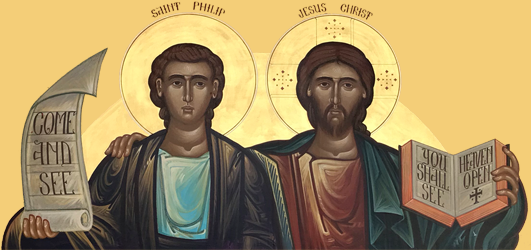Exodus 34:6-7
“Then the Lord passed before his face and proclaimed, ‘The Lord God, compassionate, merciful, longsuffering, abounding in mercy and true, preserving righteousness and showing mercy unto thousands…’” (OSB)
During Moses’ forty-day stay at the top of Mt. Sinai (Exod 24:18), God delivers to him the whole pattern of worship which Israel is to practice, which is to begin in the wilderness as they journey towards their permanent home, the Promised Land (cf. Exod 23:20-32). It is a comprehensive system involving the Tabernacle structure, the various furniture, priestly vestments, and, later, a set of sacrifices (cf. Leviticus) and holy days/feasts in which the priests and people will participate, sanctifying their whole national existence as a priestly kingdom unto the one true God.
In between the giving of these instructions (Exod 25-31) and the actual construction of the Tabernacle (Exod 35-40), Israel has one of its darkest moments. If the exodus is God’s creation of Israel as a new humanity, then the “Golden Calf” episode (Exod 32-34) is Israel’s fall story, akin to Adam and Eve’s idolatrous eating of the forbidden fruit. Having freely agreed to enter into covenant with God just a few chapters earlier (Exod 24), Israel, through the feckless leadership of Aaron, becomes unfaithful immediately, breaking the first two commandments God gave: No other gods & no idols (Exod 20:3-4). Moses demonstrates the breaking of the covenant in his prophetic sign-act of smashing the two tablets of the Torah (Exod 32:19)—one tablet for each party to the covenant, God and Israel.
Through Moses’ intercession, coming from his almost “maternal instincts” (St. Augustine, Sermon 88.24 [ACC Exodus, p. 142]), God “repents” of His intention to destroy Israel, and as such Moses becomes the paradigm for an intercessor between God and His people. We might think of St. Paul’s very “Mosaic” prayer that he be accursed so that his Jewish brethren might be saved (Rom 9:1-5; Exod 32:32; cf. 1 Thess 2:7 for Paul as “mother”). Yet it is also true that, as with Adam and Eve, God’s forgiveness does not reverse or negate all the consequences of Israel’s rebellion and sin. The covenant has been broken, Israel has jeopardized the promise. And while God in His mercy and grace commits Himself to continue His relationship with Israel, a change has taken place: the restored covenant of Exod 34:10 (OSB) is with Moses, “in the presence of all your [i.e., Moses’] people.”
But how can all of this happen? Isn’t Israel the chosen people, the seed of Abraham, through whom God will bring salvation to the whole world? How can it be that Israel becomes part of the problem in salvation history, even worshipping the creature rather than the Creator like the pagan Canaanites they are supposed to drive out of the Promised Land? The divine Apostle Paul himself wrestles with that very question in his Epistle to the Romans. Indeed, it is the driving question of the Letter (cf. Rom 1-3; 9-11). How can the elect vessel of Israel come to reject their very own Messiah? Does this not call into question all of God’s promises, God’s righteousness and covenant faithfulness?
Difficult though it be, the answer is that it is in and through Israel’s unfaithfulness that God providentially purposed both to demonstrate the true nature of the human problem (death & sin which comes from and leads to false worship) and to bring about the remedy, the trampling down of death by the crucifixion, death, and resurrection of Christ. In Christ, the credal statement of Exod 34:6-7 finds its true fulfillment, not just as a revelation of God’s character to Israel—as Jonah and Peter “son of Jonah” initially supposed (Jonah 4:2; Acts 10-11; Matt 16:17)—but to all who repent and believe in the gospel of Jesus Christ, without partiality. May we as the Church find both the appropriate comfort and warning here!
~ By Reader Justin Gohl

